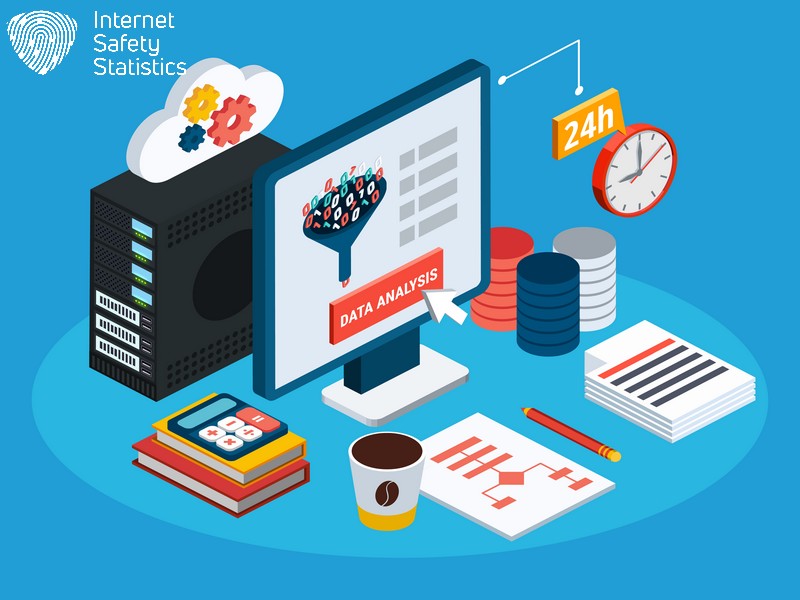
Your online privacy is at risk more than ever in today’s digital world. Blockchain technology steps up as a secure shield, keeping personal data under your control. Our personal information constantly circulates across various platforms, often beyond our control. Blockchain technology emerges as a potential game-changer in the realm of online privacy.
Blockchain acts as a secure and decentralised digital ledger, fundamentally altering how data is stored and managed. Unlike traditional methods where a central authority controls data, blockchain distributes information across a vast network of computers. This decentralisation makes data tampering highly difficult and fosters greater transparency.
This introduction to blockchain and decentralised privacy explores how this technology empowers users to take control of their personal information. We’ll delve into the core principles of blockchain and explain how it safeguards sensitive data. By understanding these concepts, you can gain valuable insight into the future of online privacy and the potential of blockchain technology to reshape the digital landscape.
Dive into the future of privacy with us!
Understanding Web3 and Its Connection to Privacy
Web3 differs from Web2’s decentralised nature, offering greater privacy protection and control over personal data. Decentralisation benefits privacy by reducing reliance on centralised entities and allowing for encrypted, peer-to-peer transactions.
How Web3 Differs from Web2
Web2 relies on centralised platforms like social media giants to manage and store our data, often leading to privacy headaches and security concerns. These corporations hold the reins over your information, using it to target ads or even accidentally leaking it due to breaches. Enter Web3, a new era where you own your data outright. Thanks to technologies such as blockchain, this next-generation web hands back control of digital identities and secures transactions through decentralised networks.
Unlike the current model, where a few big players dictate terms, Web3 distributes power amongst its users. Everyone has a say in verification processes on secure distributed ledgers, making tampering with records extremely difficult. Your digital identity becomes shielded by encryption and transparent within this peer-to-peer network—no more middlemen peering into your private life or controlling your online existence.
With decentralisation at its core, Web3 paves the way for true asset ownership and privacy protection that’s long overdue.
Benefits of Decentralisation for Privacy
Transitioning from the differences between Web3 and Web2, it’s essential to understand the benefits of decentralisation for privacy. Blockchain’s decentralised nature ensures that personal information is more secure and less susceptible to privacy issues.
This technology enables trustlessness, providing a transparent and secure way to record transactions and store data, ultimately reducing the risk of privacy breaches. Decentralised identity systems also give users greater control over their digital credentials, significantly lowering the potential for privacy issues and data breaches.
Moreover, blockchain’s immutable ledger offers enhanced security measures, protecting sensitive information from unauthorised access or misuse.
Privacy Concerns with Web3

Privacy concerns with Web3 include potential data protection risks, the need for transparency and accountability, and regulatory uncertainty surrounding decentralised systems. Understanding these challenges is crucial for navigating the evolving privacy landscape in a decentralised digital world.
Data Protection Risks
Data protection risks pose significant threats to personal privacy in Web3. The transparency of blockchain technology, while beneficial in many ways, also raises concerns about data security and the exposure of sensitive information. Regulatory uncertainty further compounds these risks, creating an environment where users’ data may be vulnerable to exploitation or misuse without clear guidelines for protection.
The decentralised nature of Web3 introduces challenges related to accountability and oversight, leaving room for potential breaches that could compromise individuals’ private information.
Transparency and Accountability
Blockchain technology ensures transparency and accountability by providing a secure and immutable record of transactions. The decentralised nature of blockchain allows for information to be verified by multiple parties, reducing the risk of fraud or manipulation. Through its transparent and tamper-proof ledger, blockchain promotes trust in data integrity, ensuring that transactions are authentic and accountable.
By leveraging blockchain technology, individuals can have greater control over their personal data ownership and authenticity. This gives users more transparency over their digital credentials, mitigating the risks associated with privacy issues and data breaches.
Regulatory Uncertainty
Regulatory uncertainty surrounding Web3 and blockchain technology is a key concern for many individuals and businesses. As governments worldwide grapple with regulating these new technologies, there is a lack of clear guidelines and standards, leading to confusion and potential legal risks.
This uncertainty can hinder adoption and investment in Web3 applications, impacting industries such as decentralised finance, gaming, and data security. Additionally, unclear regulations may create barriers for businesses seeking to leverage the benefits of blockchain technology, limiting innovation and growth in this space.
Navigating regulatory uncertainty will be crucial for the widespread adoption of Web3 technologies. Clear guidelines from regulatory bodies could provide much-needed clarity while ensuring that privacy protection and data security remain at the forefront. Addressing these concerns proactively will pave the way for users’ and businesses’ broader acceptance of decentralised privacy solutions.
The Role of Blockchain in Web3
Blockchain plays a crucial role in Web3 by providing decentralisation and trustlessness, allowing for secure and transparent transactions without intermediaries. It also offers use cases for privacy protection, such as decentralised identity and data encryption.
Decentralisation and Trustlessness
Decentralisation and trustlessness are key features of blockchain technology. In a decentralised system, there is no single point of control or failure, making it more resistant to data breaches and privacy issues. This means personal information is stored across a network rather than in one central location, reducing the risk of unauthorised access and enhancing security.
Trustlessness refers to the ability to conduct transactions without relying on a trusted third party. Through a process called consensus, each transaction is verified by multiple parties within the network, ensuring its validity and making it tamper-proof.
This eliminates the need for intermediaries, leading to transparent and secure transactions. As blockchain development advances, these fundamental principles will significantly improve data security and privacy for all users.
Use cases for privacy protection
- Decentralised identity systems enable users to control their digital credentials, reducing the risk of privacy issues and data breaches.
- Asset authenticity verification allows individuals to validate the legitimacy of digital assets, thus safeguarding against fraudulent activities.
- Cryptocurrency transactions conducted on a peer-to-peer network ensure privacy and security without the need for intermediaries that may compromise personal information.
- The play-to-earn model in the gaming industry leverages blockchain to secure user data and enable fair monetisation opportunities, enhancing user privacy.
- Blockchain facilitates transparent ownership and monetisation processes, offering users greater control over their data while earning from their contributions.
Impact of Blockchain on Privacy

Blockchain technology enhances security by providing a tamper-proof and transparent record of transactions, allowing for greater personal data protection. It also enables users to have ownership and control over their data and the potential to monetise it in a decentralised manner.
Enhanced Security
Blockchain technology enhances security for personal information by providing a tamper-proof and secure way to record transactions and store data. The decentralised and immutable nature of blockchain ensures that personal information is more secure and less susceptible to privacy issues, reducing the risk of data breaches. Through its transparent and trustless system, each transaction is verified by multiple parties using a consensus mechanism, making it highly secure against unauthorised access or manipulation.
Blockchain’s digitally distributed ledger exists across a network, guaranteeing trustworthy information sharing while reducing the risk of privacy issues and data breaches. This makes blockchain technology a game-changer in personal data protection, ensuring that users have greater control over their digital credentials while maintaining the security of their personal information.
Ownership and Monetisation
Enhanced security in blockchain technology also leads to improved ownership and monetisation opportunities. With decentralised ledger systems, individuals have greater control over their digital assets, enabling them to maintain ownership of their data and determine how it is used. Smart contracts on the blockchain provide a transparent and efficient way for users to monetise their data or digital content without relying on intermediaries.
Furthermore, the immutable nature of blockchain ensures that transactions related to ownership and monetisation are secure and can be trusted. This empowers individuals to participate in various monetisation opportunities, such as selling data directly to interested parties or receiving compensation for sharing their content within decentralised applications (dApps).
Decentralisation of Control
Blockchain technology promotes decentralisation of control, offering a transparent and secure way to store data. This means personal information is more secure and less susceptible to privacy issues. Blockchain’s digitally distributed, decentralised ledger across a network ensures trustworthy information sharing, reducing the risk of data breaches and protecting individuals’ privacy rights. Through its immutable nature, blockchain technology introduces a game-changing shift in safeguarding and maintaining personal data.
Blockchain enables trustlessness and transparency by verifying transactions through consensus among multiple parties, making it tamper-proof and secure. As a result, users gain greater control over their digital credentials with reduced risks of privacy concerns or data breaches.
Challenges and Future of Blockchain in Privacy
Blockchain technology still faces challenges regarding scalability, environmental impact, and integration with traditional systems, but its potential to revolutionise privacy protection is undeniable. Keep reading to learn more about the future of decentralised privacy and how blockchain is changing the game.
Scalability Issues
Scalability issues can hinder the widespread adoption of blockchain technology. As more transactions are processed, the network often struggles to keep up with the increasing demand, leading to slower transaction times and higher fees.
This poses a challenge for Web3 and its goal of providing efficient and scalable solutions for privacy protection. Finding ways to address these scalability issues is crucial for ensuring that blockchain can support the growing user base while maintaining fast and cost-effective transactions.
Blockchain’s scalability issues are particularly relevant as more users engage with decentralised applications (dApps) and cryptocurrencies. The limitations in processing capacity must be addressed to enable seamless user experiences without compromising security or decentralisation.
Environmental Concerns
Blockchain technology, while offering significant benefits for privacy and security, does raise environmental concerns. The energy-intensive process of verifying transactions on the blockchain network may contribute to the carbon footprint.
As the demand for blockchain technology increases, so does its impact on energy consumption. Ensuring sustainability in the face of growing interest and adoption of blockchain will be crucial for mitigating these environmental concerns.
The increasing use of blockchain technology comes with a corresponding increase in energy consumption, raising questions about its long-term environmental impact. Addressing these concerns requires thoughtful consideration and innovative solutions to balance technological advancement and environmental responsibility.
Integration with Traditional Systems

As we consider the integration of blockchain with traditional systems, it’s important to recognise that this process comes with its challenges. Organisations must ensure compatibility between existing infrastructure and new blockchain technologies to maximise the benefits without disrupting current operations.
Businesses and industries must develop seamless interfaces that efficiently transfer data and transactions from legacy systems to decentralised networks, ensuring a smooth transition without compromising security or reliability. This entails establishing robust protocols and standards for interoperability, enabling traditional systems to leverage the security and transparency offered by blockchain technology while maintaining operational continuity.
Integrating blockchain with traditional systems necessitates a thoughtful approach to streamline processes and enhance data security while acknowledging the unique demands posed by pre-existing infrastructures.
Businesses must balance adopting innovative blockchain solutions and preserving established operational frameworks, ensuring they can leverage the full potential of decentralised technologies without causing disruption or inefficiencies within their conventional systems.
Blockchain technology is revolutionising privacy protection through decentralisation and immutability. Users can now have greater control over their personal information, reducing the risk of data breaches. With enhanced security and ownership, blockchain is shaping a future where individuals have more control over their digital identities. The challenges ahead will require addressing scalability and environmental concerns while integrating blockchain with traditional systems for widespread adoption.
FAQs
1. What is decentralised privacy in blockchain?
Decentralised privacy means that your personal information is spread across a network of computers with blockchain technology, making it more secure.
2. How does blockchain improve privacy for users?
Blockchain uses encryption to protect data and lets you control who sees your information, changing the game for personal security online.
3. Can companies still access my data if I use blockchain?
With blockchain, you have more power over your data because companies must get your permission before accessing or using it.
4. Will decentralised privacy affect how I use the internet?
Yes, decentralised privacy through blockchain could change how websites and apps handle your information, giving you a safer online experience.
